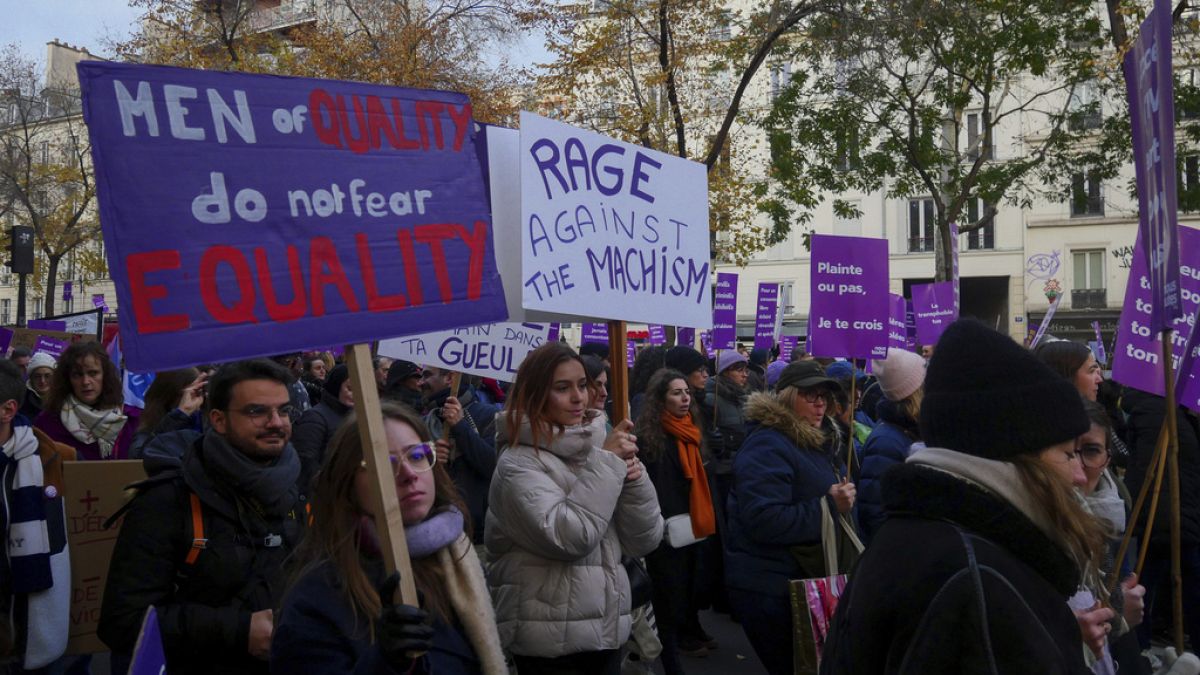World
Israel sends evacuation planes to Amsterdam after 'shocking' attack on Israeli soccer fans
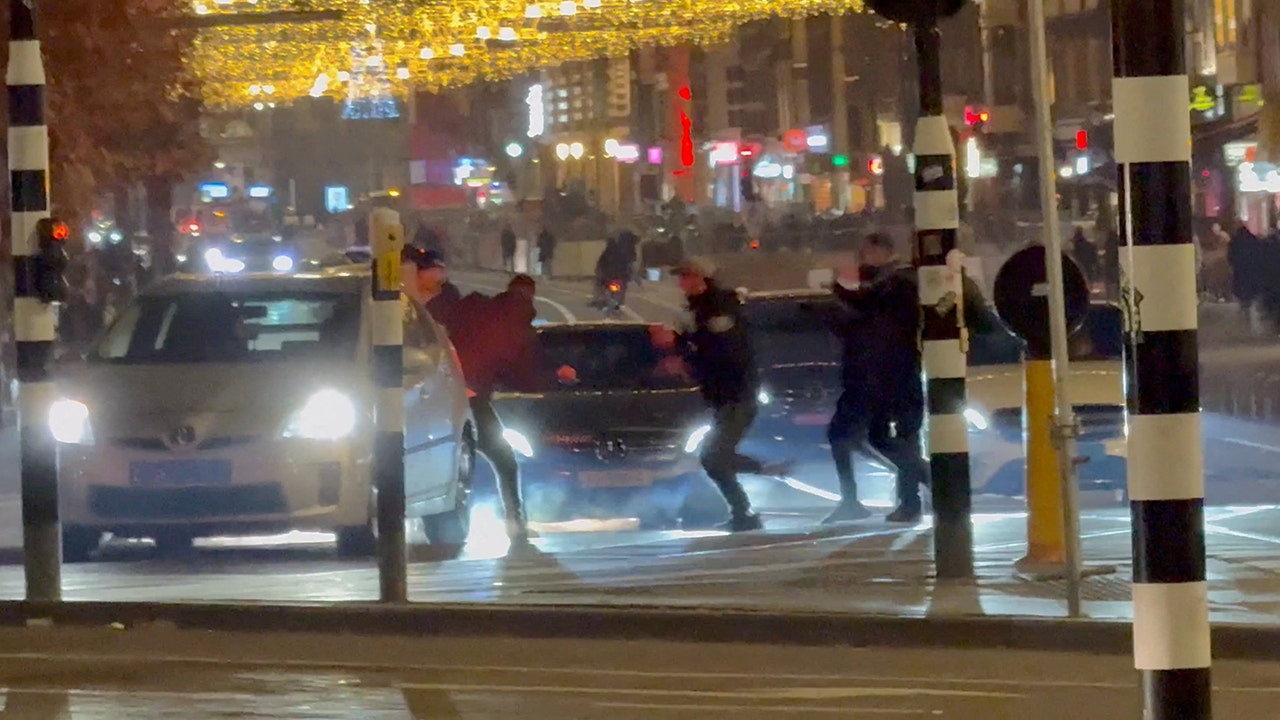
Israeli Prime Minister Benjamin Netanyahu on Friday asked his counterpart in the Netherlands to provide more security for Israelis after fans of the Maccabi Tel Aviv FC soccer team were attacked in Amsterdam on Thursday by anti-Israel protesters.
The violence erupted following a UEFA Europa League match between Ajax and Maccabi Tel Aviv. Israeli air carrier El Al is sending planes to Amsterdam on Shabbat to evacuate Israelis, after the Israeli Defense Forces said it was standing down on a plan to “immediately deploy a rescue mission” to the city.
Officials in the Netherlands say 20 to 30 people were injured in the attacks.
“The police have launched a major investigation into multiple violent incidents. So far, it is known that five people have been taken to the hospital and 62 individuals have been arrested,” Amsterdam Police said in a statement.
ISRAELI SOCCER FANS TARGETED IN WAVE OF VIOLENCE IN AMSTERDAM
Israeli football supporters and Dutch youth clash near Amsterdam Central station, in Amsterdam, Netherlands, in this still image obtained from a social media video. (X/iAnnet/via REUTERS)
Amsterdam Mayor Femke Halsema called the violence “an eruption of antisemitism that we had hoped never again to see in Amsterdam,” according to The Associated Press.
She reportedly said youths in the city were riding around on scooters in search of Israeli fans, before punching and kicking them and fleeing quickly to avoid law enforcement.
Ofek Ziv, a Maccabi fan from the Israeli city of Petah Tikva, told the AP that someone threw a rock that hit him in the head as he and a friend left the stadium. They fled the area in a taxi.
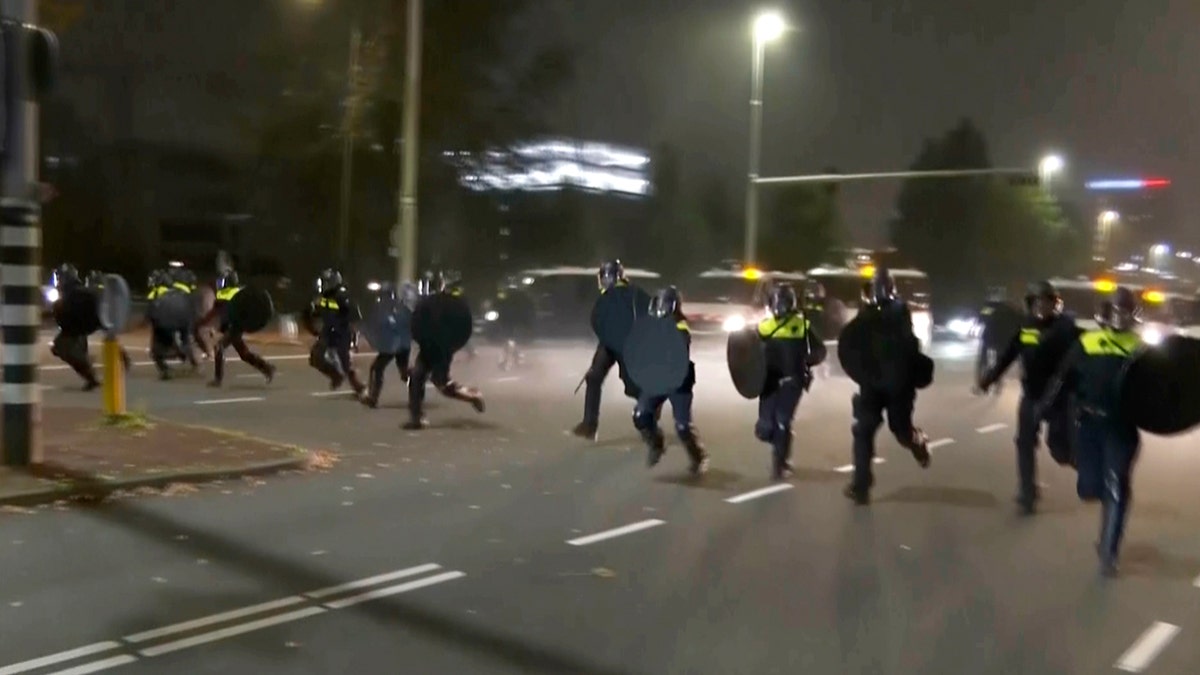
In this image taken from video, police in riot gear run towards protesters, after pro-Palestinian supporters marched near the soccer stadium in Amsterdam, Netherlands, on Thursday, Nov. 7. (RTL Nieuws via AP)
“I’m very scared, it’s very striking. This shouldn’t happen to anyone, specifically in Amsterdam. Lots of friends were hurt, injured, kidnapped, robbed, and the police didn’t come to help us,” he said.
Speaking with Dutch Prime Minister Dick Schoof after the violence, Netanyahu said he takes the “premeditated attacks” seriously. He urged Schoof to bolster security for Israelis in the country.
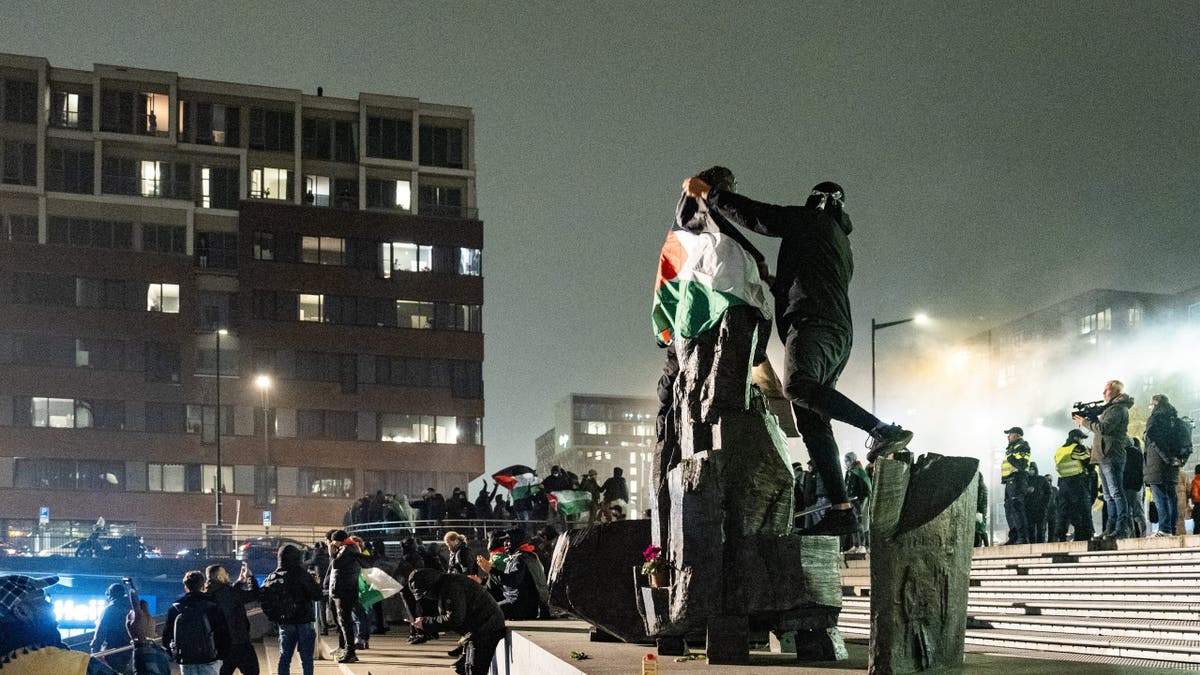
Anti-Israel agitators demonstrate at Amsterdam’s Anton de Komplein square ahead of the UEFA Europa League football match between Ajax and Maccabi Tel Aviv on Nov. 7. (Jeroen Jumelet/ANP/AFP via Getty Images)
Israel has also added more phone lines at the embassy and in the Foreign Ministry’s situation room.
Israeli President Isaac Herzog called Thursday’s attacks the most alarming thing to happen to Jews since the Oct. 7, 2023 attacks by Hamas terrorists in southern Israel.
“We woke up this morning to shocking images and videos that since October 7th, we had hoped never to see again: an antisemitic pogrom currently taking place against Maccabi Tel Aviv fans and Israeli citizens in the heart of Amsterdam, Netherlands,” Herzog wrote on X.
“This is a serious incident, a warning sign for any country that wishes to uphold the values of freedom.”
There are reports that some fans were chanting anti-Arab slogans before the game. In one social media video that Reuters says it has verified, the traveling Maccabi fans were seen setting off flares and chanting “Ole, ole, let the IDF win, we will f–k the Arabs,” in an apparent reference to the Israel Defense Forces.
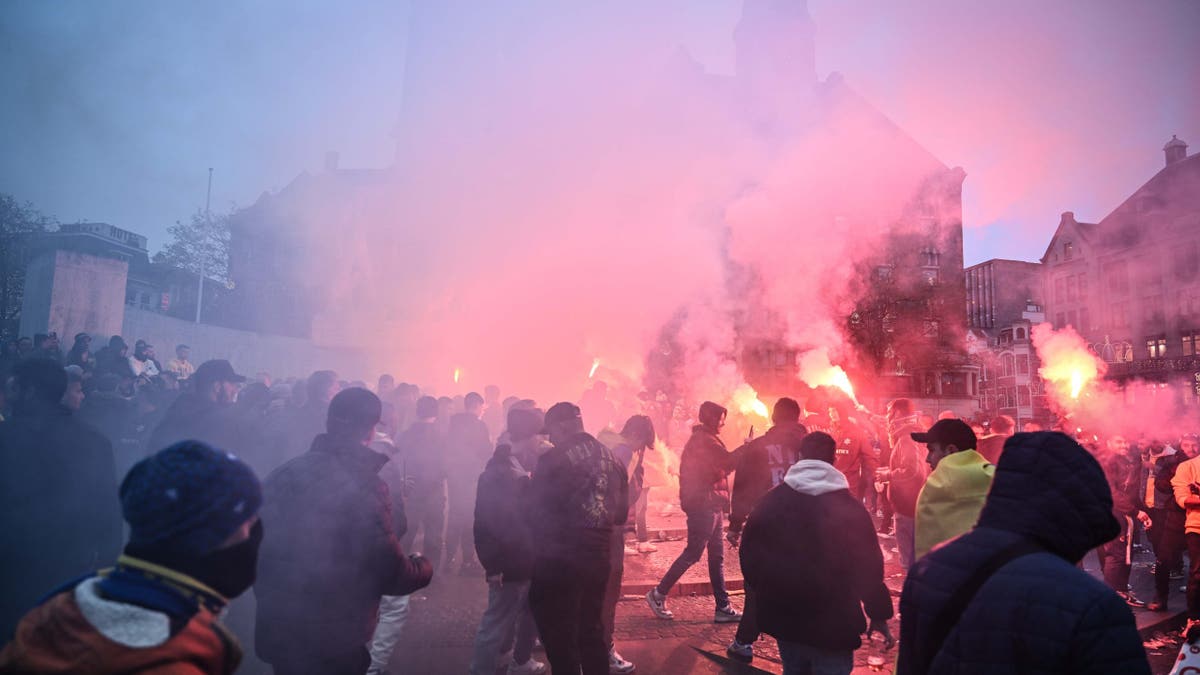
Fans of Maccabi Tel Aviv stage a pro-Israel demonstration at the Dam Square, lighting up flares and chanting slogans ahead of the UEFA Europa League match between Maccabi Tel Aviv and Ajax in Amsterdam, Netherlands on Thursday. (Mouneb Taim/Anadolu via Getty Images)
The Palestinian Ministry of Foreign Affairs says it “strongly condemns the anti-Arab slogans and hostile actions carried out by supporters of an Israeli football club in Amsterdam.
“These acts included the desecration and removal of the Palestinian flag from symbolic sites that signify solidarity with Palestinian rights and resistance against the ongoing occupation and systematic violence in Gaza,” it added.
TWO JEWISH STUDENTS AT DEPAUL UNIVERSITY TARGETED ON CAMPUS BY MASKED ATTACKERS

An Israeli Maccabi Tel Aviv soccer fan gestures as they arrive at the Ben Gurion International Airport after overnight attacks following the match between Maccabi Tel Aviv and Ajax in Amsterdam. (Reuters/Thomas Peter)
The Dutch prime minister on Friday called the “antisemitic” attacks on Israeli soccer fans “unacceptable” and said the “perpetrators will be tracked down and prosecuted.”
Videos on social media showed multiple fights happening in the streets outside the stadium where Maccabi Tel Aviv FC was playing Ajax. Days earlier, Spanish media reported that anti-Israel agitators would protest outside the stadium to target Israel’s soccer club and its fans.
ANTI-ISRAEL PROTESTERS HANDED LEGAL SETBACK IN EFFORT TO EXPAND DNC RALLY
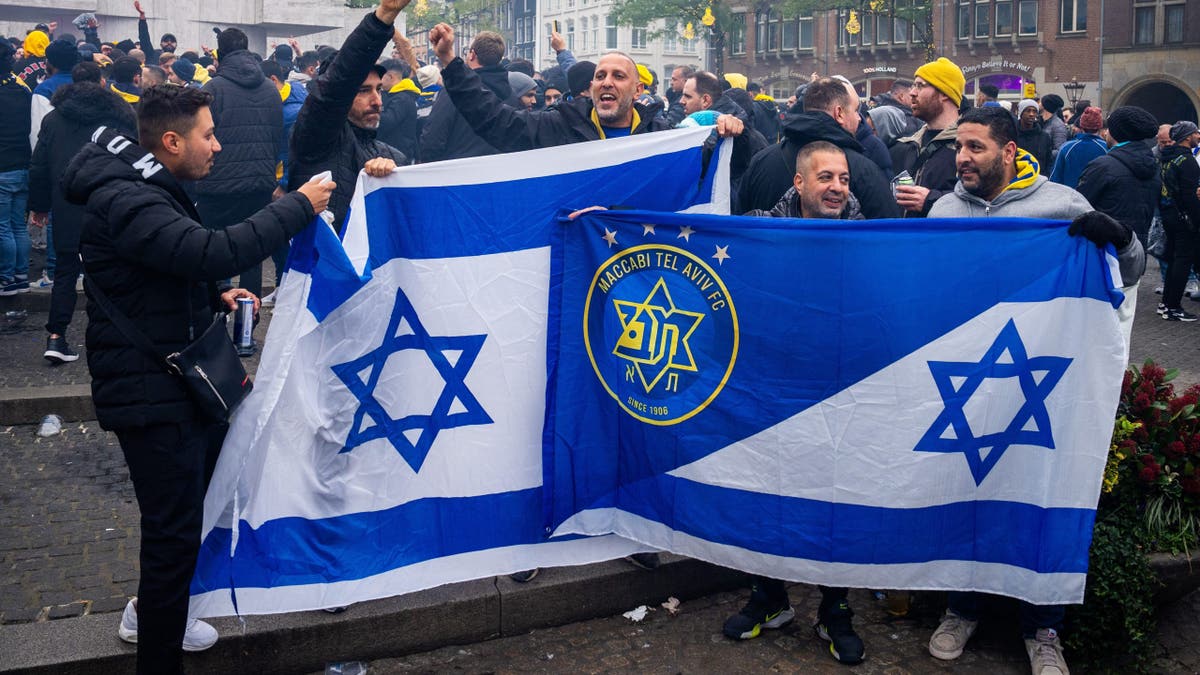
Supporters of Maccabi Tel Aviv hold flags at Dam square ahead of the Europa League football match between Ajax and Maccabi Tel Aviv, in Amsterdam on Nov. 7. (Jeroen Jumelet/ANP/AFP via Getty Images)
“We have become the Gaza of Europe,” populist Dutch political leader Geert Wilders of the anti-Muslim immigration Freedom Party in the Netherlands said following the attacks.
“Muslims with Palestinian flags hunting down Jews. I will NOT accept that. NEVER,” he wrote on X. “The authorities will be held accountable for their failure to protect the Israeli citizens. Never again.”
The IDF has barred soldiers from flying to Amsterdam, but “exceptional requests will be examined individually,” the military stated.
Fox News’ Greg Norman contributed to this report.

World
Earth bids farewell to its temporary 'mini moon' that is possibly a chunk of our actual moon
CAPE CANAVERAL, Fla. (AP) — Planet Earth is parting company with an asteroid that’s been tagging along as a “mini moon” for the past two months.
The harmless space rock will peel away on Monday, overcome by the stronger tug of the sun’s gravity. But it will zip closer for a quick visit in January.
NASA will use a radar antenna to observe the 33-foot (10-meter) asteroid then. That should deepen scientists’ understanding of the object known as 2024 PT5, quite possibly a boulder that was blasted off the moon by an impacting, crater-forming asteroid.
While not technically a moon — NASA stresses it was never captured by Earth’s gravity and fully in orbit — it’s “an interesting object” worthy of study.
The astrophysicist brothers who identified the asteroid’s “mini moon behavior,” Raul and Carlos de la Fuente Marcos of Complutense University of Madrid, have collaborated with telescopes in the Canary Islands for hundreds of observations so far.
Currently more than 2 million miles (3.5 million kilometers) away, the object is too small and faint to see without a powerful telescope. It will pass as close as 1.1 million miles (1.8 million kilometers) of Earth in January, maintaining a safe distance before it zooms farther into the solar system while orbiting the sun, not to return until 2055. That’s almost five times farther than the moon.
First spotted in August, the asteroid began its semi jog around Earth in late September, after coming under the grips of Earth’s gravity and following a horseshoe-shaped path. By the time it returns next year, it will be moving too fast — more than double its speed from September — to hang around, said Raul de la Fuente Marcos.
NASA will track the asteroid for more than a week in January using the Goldstone solar system radar antenna in California’s Mojave Desert, part of the Deep Space Network.
Current data suggest that during its 2055 visit, the sun-circling asteroid will once again make a temporary and partial lap around Earth.
___
The Associated Press Health and Science Department receives support from the Howard Hughes Medical Institute’s Science and Educational Media Group. The AP is solely responsible for all content.
World
Israel confirms death of missing Abu Dhabi rabbi: 'Abhorrent act of antisemitic terrorism’
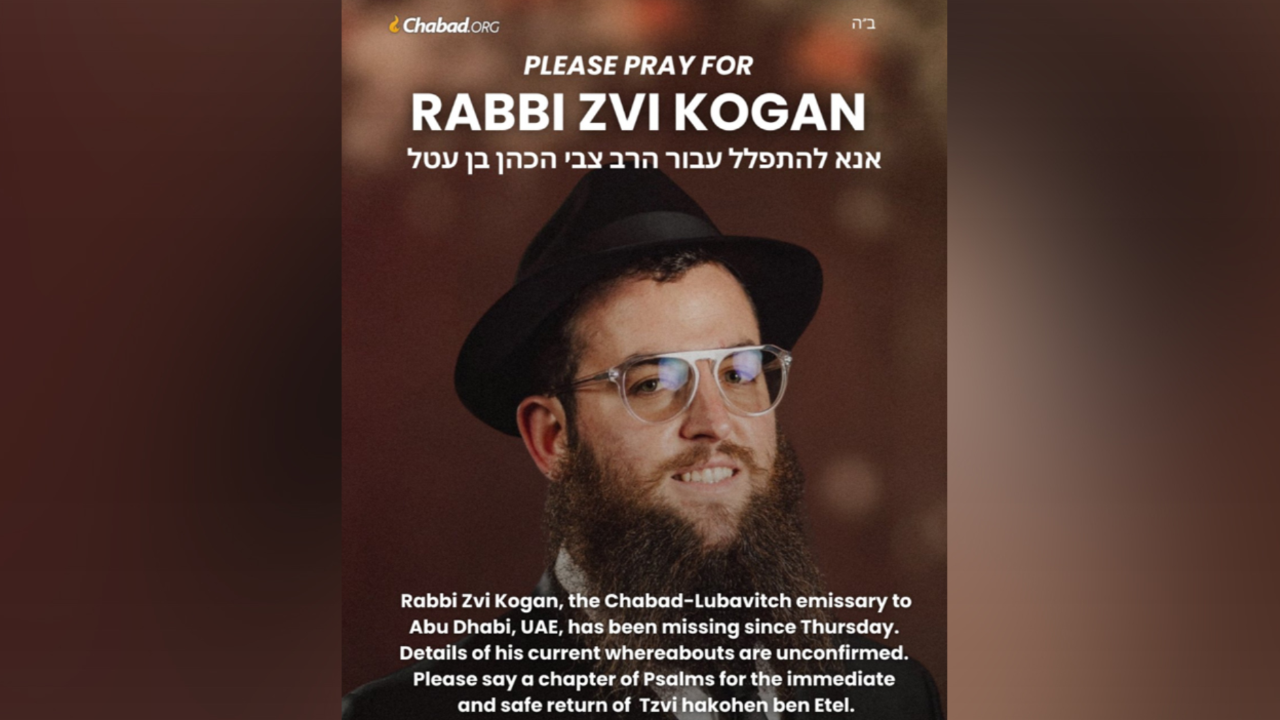
Israeli officials on Sunday confirmed the death of an Abu Dhabi rabbi who had been missing since Thursday.
“The UAE intelligence and security authorities have located the body of Zvi Kogan, who has been missing since Thursday, 21 November 2024,” the Israeli Prime Minister’s Office and the Ministry of Foreign Affairs said in a statement on X. “The Israeli mission in Abu Dhabi has been in contact with the family from the start of the event and is continuing to assist it at this difficult time; his family in Israel has also been updated.”
“The murder of Zvi Kogan, of blessed memory, is an abhorrent act of antisemitic terrorism. The State of Israel will use all means and will deal with the criminals responsible for his death to the fullest extent of the law,” the statement added.
RABBI FEARED KIDNAPPED, KILLED BY TERRORISTS AFTER GOING MISSING, PROMPTING INVESTIGATION
Rabbi Zvi Kogan, a Chabad emissary, had been missing since Thursday. (Chabad.org via X)
Rabbi Zvi Kogan was an emissary of the Chabad Lubavitch movement, a prominent and highly observant branch of Hasidic Judaism based in Brooklyn’s Crown Heights neighborhood in New York City.
The 28-year-old was a resident of Abu Dhabi in the United Arab Emirates when he went missing Thursday. He is a citizen of both Moldova and Israel.
According to his LinkedIn, Kogan worked as a recruiter and was “passionate about volunteering and serving [his] community.”
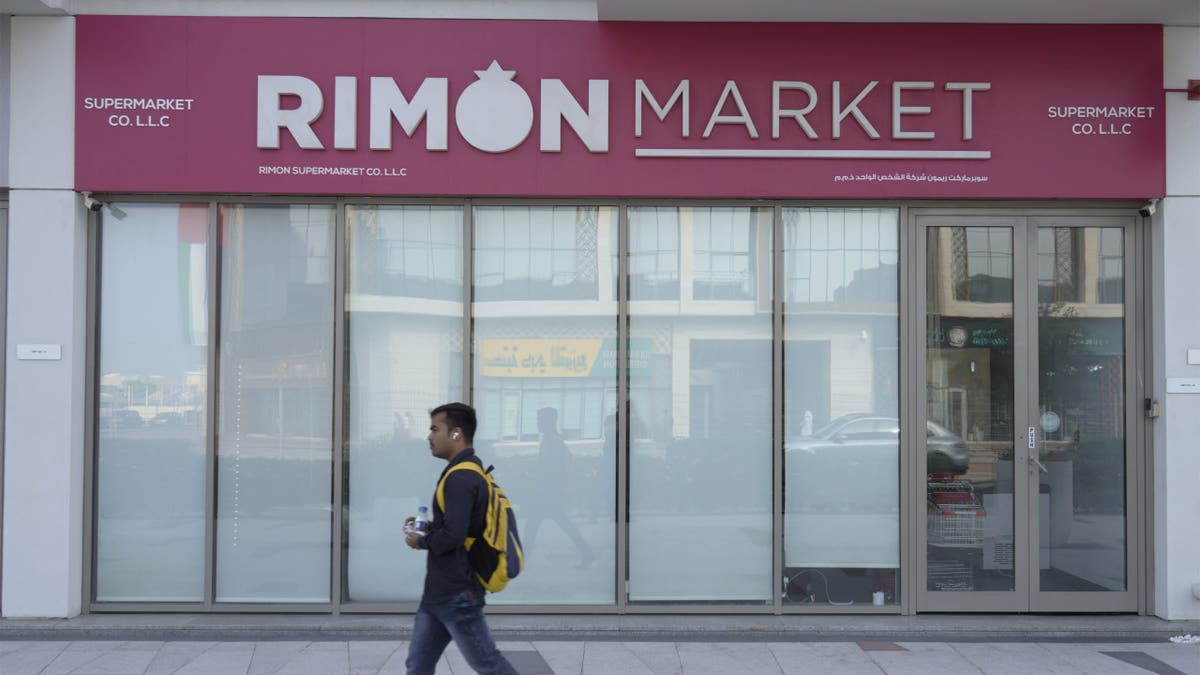
A man walks past Rimon Market, a Kosher grocery store managed by the late Rabbi Zvi Kogan, in Dubai, United Arab Emirates, Sunday, Nov. 24, 2024. (AP Photo/Jon Gambrell)
‘CHEERLEADING FOR TERRORISM’: TWITCH STAR CALLED FOR NEW 9/11, DISMISSED HORROR OF OCT 7
The Israeli Prime Minister’s Office announced its investigation into the unusual disappearance on Saturday. At the time, the statement said the disappearance appeared to be related to “a terrorist incident” but did not elaborate.
The United Arab Emirates’ Ministry of Interior had confirmed it was investigating Kogan’s disappearance, but described his citizenship solely as a “Moldovan national.”
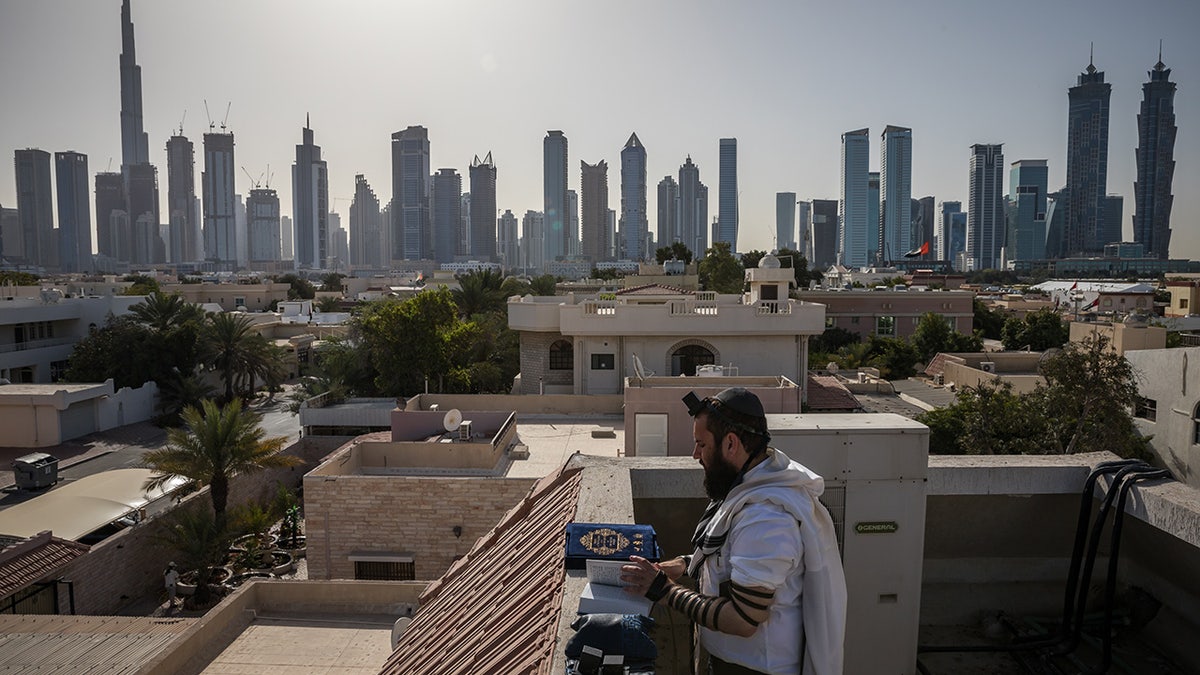
Rabbi Levi Duchman performs morning prayers on the roof of the Jewish Community Center of the UAE on March 22, 2021, in Dubai, United Arab Emirates. (Andrea DiCenzo/Getty Images)
CLICK TO GET THE FOX NEWS APP
The Rimon Market, a Kosher grocery store that Kogan managed on Dubai’s busy Al Wasl Road, was shut Sunday, according to the Associated Press. It had been a target of anti-Israel protests.
Kogan’s wife, Rivky, is a U.S. citizen who lived with him in the UAE. She is the niece of Rabbi Gavriel Holtzberg, who was killed in the 2008 Mumbai attacks.
The Associated Press contributed to this report.
World
‘Optical illusion’: Key takeaways from COP29

Rich countries have pledged to contribute $300bn a year by 2035 to help poorer nations combat the effects of climate change after two weeks of intense negotiations at the United Nations climate summit (COP29) in Azerbaijan’s capital, Baku.
While this marks a significant increase from the previous $100bn pledge, the deal has been sharply criticised by developing nations as woefully insufficient to address the scale of the climate crisis.
This year’s summit, hosted by the oil and gas-rich former Soviet republic, unfolded against the backdrop of a looming political shift in the United States as a climate-sceptic Donald Trump administration takes office in January. Faced with this uncertainty, many countries deemed the failure to secure a new financial agreement in Baku an unacceptable risk.
Here are the key takeaways from this year’s summit:
‘No real money on the table’: $300bn climate finance fund slammed
While a broader target of $1.3 trillion annually by 2035 was adopted, only $300bn annually was designated for grants and low-interest loans from developed nations to aid the developing world in transitioning to low-carbon economies and preparing for climate change effects.
Under the deal, the majority of the funding is expected to come from private investment and alternative sources, such as proposed levies on fossil fuels and frequent flyers – which remain under discussion.
“The rich world staged a great escape in Baku,” said Mohamed Adow, the Kenyan director of Power Shift Africa, a think tank.
“With no real money on the table, and vague and unaccountable promises of funds to be mobilised, they are trying to shirk their climate finance obligations,” he added, explaining that “poor countries needed to see clear, grant-based, climate finance” which “was sorely lacking”.
The deal states that developed nations would be “taking the lead” in providing the $300bn – implying that others could join.
The US and the European Union want newly wealthy emerging economies like China – currently the world’s largest emitter – to chip in. But the deal only “encourages” emerging economies to make voluntary contributions.
Failure to explicitly repeat the call for a transition away from fossil fuels
A call to “transition away” from coal, oil, and gas made during last year’s COP28 summit in Dubai, the United Arab Emirates, was touted as groundbreaking – the first time that 200 countries, including top oil and gas producers like Saudi Arabia and the US, acknowledged the need to phase down fossil fuels. But the latest talks only referred to the Dubai deal, without explicitly repeating the call for a transition away from fossil fuels.
Azerbaijan’s President Ilham Aliyev referred to fossil fuel resources as a “gift from God” during his keynote opening speech.
New carbon credit trading rules approved
New rules allowing wealthy, high-emission countries to buy carbon-cutting “offsets” from developing nations were approved this week.
The initiative, known as Article 6 of the Paris Agreement, establishes frameworks for both direct country-to-country carbon trading and a UN-regulated marketplace.
Proponents believe this could channel vital investment into developing nations, where many carbon credits are generated through activities like reforestation, protecting carbon sinks, and transitioning to clean energy.
However, critics warn that without strict safeguards, these systems could be exploited to greenwash climate targets, allowing leading polluters to delay meaningful emissions reductions. The unregulated carbon market has previously faced scandals, raising concerns about the effectiveness and integrity of these credits.
Disagreements within the developing world
The negotiations were also the scene of disagreements within the developing world.
The Least Developed Countries (LDCs) bloc had asked that it receive $220bn per year, while the Alliance of Small Island States (AOSIS) wanted $39bn – demands that were opposed by other developing nations.
The figures did not appear in the final deal. Instead, it calls for tripling other public funds they receive by 2030.
The next COP, in Brazil in 2025, is expected to issue a report on how to boost climate finance for these countries.
Who said what?
EU Commission President Ursula von der Leyen hailed the deal in Baku as marking “a new era for climate cooperation and finance”.
She said the $300bn agreement after marathon talks “will drive investments in the clean transition, bringing down emissions and building resilience to climate change”.
US President Joe Biden cast the agreement reached in Baku as a “historic outcome”, while EU climate envoy Wopke Hoekstra said it would be remembered as “the start of a new era for climate finance”.
But others fully disagreed. India, a vociferous critic of rich countries’ stance in climate negotiations, called it “a paltry sum”.
“This document is little more than an optical illusion,” India’s delegate Chandni Raina said.
Sierra Leone’s Environment Minister Jiwoh Abdulai said the deal showed a “lack of goodwill” from rich countries to stand by the world’s poorest as they confront rising seas and harsher droughts. Nigeria’s envoy Nkiruka Maduekwe called it “an insult”.
Is the COP process in doubt?
Despite years of celebrated climate agreements, greenhouse gas emissions and global temperatures continue to rise, with 2024 on track to be the hottest year recorded. The intensifying effects of extreme weather highlight the insufficient pace of action to avert a full-blown climate crisis.
The COP29 finance deal has drawn criticism as inadequate.
Adding to the unease, Trump’s presidential election victory loomed over the talks, with his pledges to withdraw the US from global climate efforts and appoint a climate sceptic as energy secretary further dampening optimism.
‘No longer fit for purpose’
The Kick the Big Polluters Out (KBPO) coalition of NGOs analysed accreditations at the summit, calculating that more than 1,700 people linked to fossil fuel interests attended.
A group of leading climate activists and scientists, including former UN Secretary-General Ban Ki-moon, warned earlier this month that the COP process was “no longer fit for purpose”.
They urged smaller, more frequent meetings, strict criteria for host countries and rules to ensure companies showed clear climate commitments before being allowed to send lobbyists to the talks.
-

 Business1 week ago
Business1 week agoColumn: Molly White's message for journalists going freelance — be ready for the pitfalls
-

 Science5 days ago
Science5 days agoTrump nominates Dr. Oz to head Medicare and Medicaid and help take on 'illness industrial complex'
-

 Politics7 days ago
Politics7 days agoTrump taps FCC member Brendan Carr to lead agency: 'Warrior for Free Speech'
-
/cdn.vox-cdn.com/uploads/chorus_asset/file/25739950/247386_Elon_Musk_Open_AI_CVirginia.jpg)
/cdn.vox-cdn.com/uploads/chorus_asset/file/25739950/247386_Elon_Musk_Open_AI_CVirginia.jpg) Technology6 days ago
Technology6 days agoInside Elon Musk’s messy breakup with OpenAI
-

 Lifestyle7 days ago
Lifestyle7 days agoSome in the U.S. farm industry are alarmed by Trump's embrace of RFK Jr. and tariffs
-

 World7 days ago
World7 days agoProtesters in Slovakia rally against Robert Fico’s populist government
-

 News6 days ago
News6 days agoThey disagree about a lot, but these singers figure out how to stay in harmony
-

 News7 days ago
News7 days agoGaetz-gate: Navigating the President-elect's most baffling Cabinet pick













